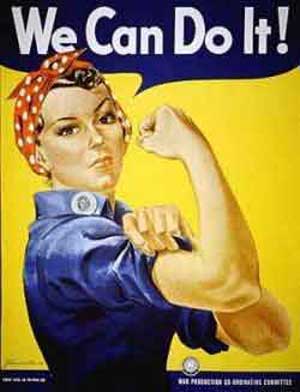Overworked and Underpaid...Still

So, the first night I spent at my dad's place, we sat up late drinking wine and talking about various life issues. It started pretty lightly, but then moved to more serious topics - one of which is very important to me (for obvious reasons). Dad mentioned a book by John Stossel (of 20/20 fame) that makes the claim that it is a myth that men make more than women, and asked me what I thought about that statement. I think a lot about that statement. My first reaction was to become upset and say what an idiot Stossel is for asserting that women make just as much as men. And, I suppose, if a person was to look at side-by-side comparisons of a particular occupation (all other things being equal such as education level, years of experience, etc), that a woman and a man have the potential to earn the same salary. However, what happens on paper and what happens in real life are often two different things. For example, employers are not supposed to discriminate when hiring potential employees based on race, background, age, disability, or gender, but you and I know that they do. Also, does Stossel's claim take into account gender specific fields - the fact that a higher number of women are teachers than men. Why is that? Gee, it might be because teachers have more "family friendly" hours than, say, firefighters. Why is that important? Who is expected to take care of the household and bring in her share of the family's bacon? Women can't do that if they take a job that demands a 12 hour workday or that puts her in dangerous circumstances on a regular basis. Now, some women would argue that you CAN do it all, but I'm not one of those women - I am a realist and I will unashamedly tell anyone (usually when they are making requests of me) that "I am not Wonder Woman". So, strictly speaking, yes, it's a woman's choice that she takes jobs that are less in-demand and less dangerous than the jobs men take. But who decides that the male dominated fields should pay more than the female dominated fields? Possibly the same people who thought, some 40 or so years ago, that a woman's place was strictly in the home.
Not one to spout off without at least providing some facts, I did a Google search on women's versus men's salaries. I was feeling pretty validated when I found an article that made the points I've mentioned above, as well as some others - they even referenced Census Bureau statistics and the NAFE (National Association for Female Executives). However, there are plenty of articles that support Stossel's claim - even going so far as to say that, because men are more productive than women (WHAT?!?), they get paid more for similar jobs. There are also government websites with articles comparing male and female salaries in engineering, with results that would indicate that the pay is similar. They also mention that this particular field is about 90% male and 10% female - no surprise there. I came along a very interesting article on the US goverment's website under the National Agricultural Statistics Service, which highlighted the fact that women (and girls), on average, spend more time in "unpaid" activities (which, in this article, are referred to as "economic contribution") such as childcare or care for the elderly. On the plus side, since we live in a "developed" country, higher education is afforded to both men and women, as opposed to "developing" economies, where men have more access to education than women do. Unfortunately, this articles does not go in-depth as to the disparities between men's and women's incomes, but instead suggests ways in which to obtain more information. A good, general knowledge website, that provides information on various professions, including working conditions, education requirements, salary, etc, is the US Department of Labor site. Again, I was not able to find statistics on male-dominated versus female-dominated fields, but if you read the description of "nature of the work" for each field, it is not difficult to determine which areas are "male-friendly" and which ones are "female-friendly".
The bottom line is that I will not argue that women are slowly closing the salary gap, but we're not there yet, unless you take a very over-simplified view of men's versus women's salaries without looking at "real world" examples.


7 Comments:
Thank you for the recommendation - I hate spouting off and getting all riled up without at least having some facts behind my rantings and ravings.
Well, I have never felt one way or the other about John Stossel, but isn't always the person who's "on top" who asserts that there is no inequity? It's always easy for people in that position to do so, and that is what irks me. I understand differences between genders - I see it every day when I work with my students. Yeah, I'm glad I don't live somewhere less developed - I can't imagine not having the opportunities I've had.
I agree that there is still inequality when it comes to women's salaries. I figured it was because employers believe women to be riskier employees because they have uteruses and take time to have children. It's unfair but change takes time.
Amen, sister! Kind of funny how people are always bemoaning "shortages" in the two most women-dominated fields -- nursing and teaching -- yet they remain underpaid compared to jobs dominated by men.
Further reading about the economic sacrifices we make for our families (which I used for that working mothers article I wrote back at the Chron):
"The Price of Motherhood" by Ann Crittendon
"The Second Shift" by Arlie Hothschild (sp?)
The Second Shift is actually a bit encouraging because it was written in the 80s and you can see that things *have* changed since then, especially when you have good partners like we do. But still, reading these books left me angry and, well, hurt when I realized the many ways in which my work and skills are undervalued in our society.
Angelique - Honestly, the fact that women are the "child bearers" was brought up in several articles. It is something that the opposition used in order to say things like "well, women are in the office less hours than a man". Well, yes, but if it's not us who are taking care of our families, then who will?
Tessence - I thought you had written an article that was similar, but I could not find it. Thank you for the book recommendations. I'll tell ya, I'm glad we have supportive men in our lives, but how many women are struggling alone? Some of the statistics I read on the government sites indicated that, since women earn less than men, that single women are dealing with smaller problems like short-term malnutrition to bigger problems like not being secure in retirement. I am curious how long it will take. Incidentally, teachers will continue to be underpaid as long as their salaries are fully funded by the state. That's one of the reasons why I intend to not remain "in the system" for much longer.
The package we did about the daily lives of working moms is here:
http://www.sfgate.com/cgi-bin/article.cgi?file=/c/a/2006/05/14/MNGKLIRPUA1.DTL
Tessence - The link didn't work, but I was able to find it anyway, with a little digging. I liked the article - I didn't realize you could find statistics on the make-up of the labor force. I don't always know the best way to find information like that.
Post a Comment
<< Home